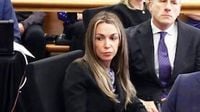After nearly three years since the tragic death of Boston police officer John O'Keefe, the retrial of Karen Read has once again left the courtroom in suspense. On June 17, 2025, jurors deliberating over Read’s fate concluded their day without reaching a verdict, signaling the complexity and intensity surrounding this high-profile case.
Judge Beverly Cannone dismissed the jury shortly before 4 p.m., acknowledging the long and taxing day they had endured. “It’s been a long day for everybody,” she told the jurors before sending them home with instructions to clear their heads and return fresh the next morning. The jury, comprised of seven women and five men, had spent approximately 16 hours deliberating over the charges across multiple days.
The case against Karen Read centers on allegations that she struck and killed her boyfriend, John O’Keefe, with her SUV during a snowstorm on January 29, 2022, after a night of heavy drinking. Prosecutors have charged her with second-degree murder, manslaughter while operating a motor vehicle under the influence (OUI), and leaving the scene of a fatal collision. The OUI manslaughter charge also carries lesser included offenses such as involuntary manslaughter, motor vehicle homicide, and OUI alone.
Throughout the trial, jurors have grappled with conflicting narratives. The prosecution paints a picture of a deadly act fueled by intoxication and rage, while the defense argues that Read was framed in a conspiracy involving local law enforcement. The defense alleges that O’Keefe was beaten inside a home, bitten by a dog, and subsequently left outside, with evidence against Read being planted to cover up the truth.
On June 17, the jury sent four written questions to Judge Cannone, providing a rare glimpse into their deliberation process. Their first question sought clarity on the timeframe for the OUI charge, specifically whether the relevant time was 12:45 a.m. or 5 a.m. on January 29, 2022. This question arose from conflicting evidence: prosecutors focused on the early morning hours just after midnight, while jurors also viewed video footage of Read driving shortly after 5 a.m., and heard testimony about her blood alcohol content measured around 9 a.m., which hovered near the legal limit of 0.08%.
Judge Cannone declined to specify an exact time, instead reminding jurors that they are the ultimate fact-finders. “You folks have all the evidence,” she said. “And remember, it’s only you who decide the facts in this case.” This response was consistent with the defense's position, which opposed pinpointing a specific time absent from the indictment.
The second question concerned whether video clips of Read’s media interviews could be considered evidence and, if so, how jurors should weigh them. Judge Cannone confirmed that the clips are indeed evidence and instructed the jury to consider Read’s statements as they would any other piece of evidence, giving them whatever weight they deemed appropriate. However, defense attorney Alan Jackson expressed concern that the judge’s wording might not sufficiently caution jurors about the weight to assign the clips, fearing it could prejudice the jury. He had requested language clarifying that jurors should give the statements “whatever weight, if any,” they saw fit, but the judge did not incorporate this nuance.
The jury’s third question related to the verdict slip and whether a guilty verdict on a lesser included offense would also constitute a conviction on the overall charge. This issue had been a point of contention throughout the trial. The defense had previously filed a motion to amend the verdict slip, arguing that the current form was confusing and potentially biased towards guilty verdicts due to its structure. Judge Cannone denied that motion on June 16, citing consistency with Massachusetts law and the accompanying jury instructions. However, after the jury’s inquiry, she agreed to amend the verdict slip to make it clearer and personally walked jurors through the updated form to ensure understanding.
Perhaps the most telling question came later in the day when the jury asked: “If we find not guilty on two charges but can’t agree on one charge, is it a hung jury on all three charges or just one charge?” This query suggested the jurors might be nearing consensus on some counts but remain deadlocked on others, echoing the outcome of Read’s first trial in 2024. That earlier trial ended in a mistrial after 27 hours of deliberations, with jurors reportedly agreeing to acquit Read of second-degree murder and leaving the scene charges but deadlocking on the OUI manslaughter count.
Judge Cannone declined to answer the theoretical question, stating, “This is not a question I can answer.” After defense objections highlighting the risk of repeating the previous mistrial, she amended her response to emphasize that it was a theoretical question outside her purview. Defense attorney Alan Jackson voiced concerns that failure to address this question might leave jurors confused and prolong deliberations or deadlock the jury again.
The trial’s atmosphere outside the courtroom has been charged with emotion and community involvement. Supporters of Read, many dressed in pink and carrying signs, have gathered daily outside Norfolk Superior Court in Dedham, Massachusetts, showing unwavering support and voicing concerns about systemic injustices. Meanwhile, the O’Keefe family has maintained a low profile, entering and exiting the courthouse without comment.
Karen Read, 45, a former adjunct professor at Bentley University from Mansfield, Massachusetts, has consistently maintained her innocence, asserting that she was framed in a botched and biased investigation. The defense’s narrative challenges the prosecution’s version of events, painting a complex picture of alleged police misconduct and conspiracy.
Legal analysts following the case suggest that the jury’s questions, especially those about the media clips and the OUI timeframe, could indicate a shift in momentum toward the defense. Katherine Loftus, a legal analyst with WBZ, noted that the jurors’ focus on these elements might be beneficial to Read’s case.
With no court scheduled on June 19 due to a holiday, all eyes remain on the Norfolk Superior Court as the jury resumes deliberations on June 18. The length and nature of the deliberations, combined with the jury’s pointed questions, underscore the complexity of the case and the challenge jurors face in reaching a unanimous verdict.
As the trial enters this critical phase, the lingering question remains: will the jury finally reach a verdict, or will history repeat itself with another deadlock? For now, the courtroom waits, and the community watches closely, hoping for resolution in a case that has gripped Massachusetts for years.



